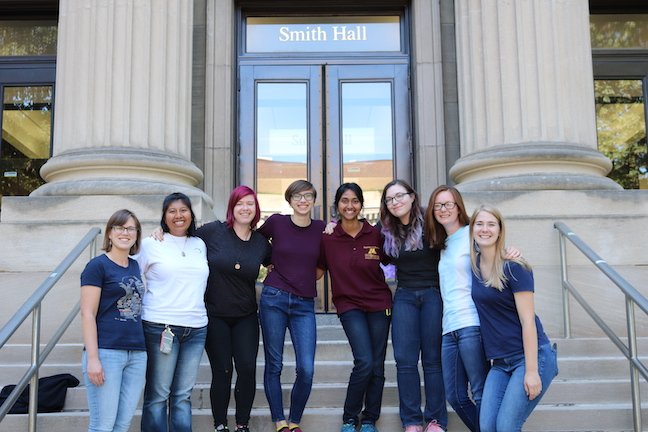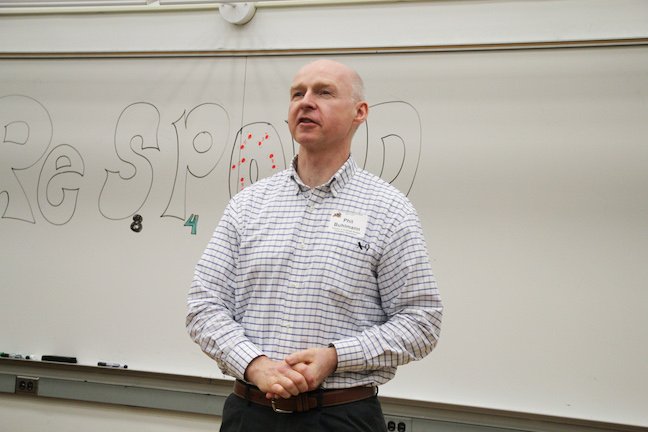A culture of care

CSE’s chemistry community prioritizes mental health
May 28, 2020
The minute professor Phil Buhlmann became the director of graduate studies in the College of Science and Engineering’s Department of Chemistry in 2012, he knew he wanted to make mental health a priority.
Buhlmann had seen the unique pressures put on graduate students to achieve at high levels in both the classroom and the research lab. He also knew the devastating effects of ignoring mental health, having witnessed that as a young student himself in college.
Spurred to action by a mental health course he took at Boynton, the University of Minnesota's on-campus health clinic, Buhlmann brought Boynton staff to the chemistry department for its first workshop on stress and mental health. He also helped to form the Community of Chemistry Graduate Students (CCGS) in his department.
Together, with Boynton staff and CCGS student leaders, Buhlmann launched a biennial survey of chemistry grad students with the goal of pinpointing their biggest stressors. The results paved the way for the University's chemistry community to become a national leader in programs for graduate student mental health.
And, the timing couldn't be better. The novel coronavirus pandemic has unexpectedly added another level of stress for students.
“Mental illness affects a lot of people, and it also affects a lot of very, very smart people,” Buhlmann explained.
“We have 250 graduate students in this department—so even if a small fraction is struggling, it’s still a significant number,” he said.
According to the National Institute of Mental Health, nearly one in five adults in the United States live with a mental illness (46.6 million in 2017). Young adults aged 18-25 years had the highest prevalence (25.8%) compared to adults aged 26-49 years (22.2%).
Addressing a national problem
Nearly a decade after Buhlmann worked with Boynton and CCGS to conduct the first survey, mental health awareness has become a more prevalent topic nationwide. Plus, it has become more ingrained into the fabric of the College of Science and Engineering's chemistry department.
Not only have the faculty and staff embraced this—chemistry boasts four faculty trained as mental health advocates, one of the highest numbers of any department on the University of Minnesota Twin Cities campus—but they also collaborate heavily with the students in CCGS to create a welcoming environment that prioritizes the happiness and health of everyone in the department.
CCGS continues to be student-run, with Buhlmann as its advisor. The group hosts coffee social hours, weekly running excursions, meditation sessions, and myriad other activities to promote students’ wellbeing.
Now, the COVID-19 pandemic and social distancing regulations have limited some of these, but CCGS has adapted to foster community virtually. Its students even launched a new initiative called "Grad2Grad: Mental Health Support," which gives graduate students the opportunity to talk individually to other graduate students about their struggles.
"The goal of this initiative is to offer graduate students in distress an alternative to Mental Health Advocates, who are all faculty members of staff," Buhlmann explained. "Instead, the graduate students get offered the opportunity to talk to a fellow graduate student, hopefully lowering the barrier for students to seek advice and help."
Grad2Grad is run through the online CCGS Slack channel, where the students also host virtual pet meet-and-greets and other stress relieving activities.
Why mental health?
Buhlmann first witnessed the impact of mental illness during his own undergraduate studies in Zurich, Switzerland, when he had a professor who walked out of class after declaring, “I can’t do this anymore.” But, Buhlmann became more interested in disorders that affect human mood, thinking, and behavior when he had his first interactions with graduate students who struggled with mass amounts of stress.
“It then became clear to me that we needed to do something about mental health,” Buhlmann said.
While the conversation surrounding mental health has gradually become more prevalent over the past decade, Buhlmann said there is still a huge disparity in how mental health is addressed among both undergraduate and graduate students nationwide.
Moreover, graduate students across the United States face different stressors than undergraduates, such as the pressures to achieve desired results in experiments or get their research published.

Rachel Swedin, a fourth-year grad student in chemistry and CCGS event coordinator, has experienced these concerns firsthand.
Swedin joined CCGS her second year after grappling with anxiety and imposter syndrome, a feeling of chronic self-doubt that she found also plagued many other students in CCGS. According to the American Psychological Association, imposter syndrome is incredibly common nationwide, especially among high achievers in academia.
“I thought if I got involved with mental health [awareness] in the department, I could work through my own mental health a little better too,” she said.
“I think it’s really important in research to also think about your own personal health,” Swedin explained.
“And CCGS putting that at the forefront makes it recognizable throughout the department,” she added.
Swedin said the best part of being involved in CCGS is having a community of people in which everyone is free to talk about what they’re struggling with, be it research-related stress or their personal lives.
“By emphasizing mental health, you make it more of a norm,” she said. “You make it more known that it’s not weird to need mental health services, and it’s not weird to need a break from work.”
Educating across the department
In May 2019, the College of Science and Engineering chemistry faculty, staff, researchers, and students held their first department-wide workshop event specifically focused on mental health.
With more than 150 attendees, the event facilitated conversations about stress and mental illness and included speakers from the University of Minnesota's Boynton Health, Disability Resource Center, and Office of Student Affairs’ Care Program.
Third-year chemistry graduate student and CCGS co-president Maetzin Cruz-Reyes helped create videos that showed potential scenarios of students, postdocs, or staff expressing mental health concerns and outlined how to best resolve them.
Cruz-Reyes said they wanted to highlight interactions that weren’t just between students and their advisors, since tackling mental health involves everyone in the department.
“Grad school is a time of failures, isolation, and maybe competition," she said. "But we have a [department] that fosters mental health and wellness and makes it less difficult and less isolated,” Cruz-Reyes said.
And this emphasis on mental health doesn’t just get students through graduate school—it shapes their entire experience at the University of Minnesota.
“If I were at a different university, I might not have had this program,” Swedin said. “I would’ve stayed silent, gone to counseling, put my nose down and kept going.
“Here, I feel like I can really talk about my mental health and be more open about the issues I go through," Swedin noted.
Buhlmann believes the College of Science and Engineering’s chemistry department is ahead of many other chemistry programs across the United States. Its mental health initiatives have been featured in national chemistry journals like the American Chemical Society’s (ACS) Chemical & Engineering News. Buhlmann recently spoke at an ACS webinar about navigating mental health in graduate school, which more than 400 participants attended.
He hopes they inspire other programs to take action.
“We’ve developed a culture here where students are well aware that we talk openly about stress and mental health,” he said. “I think we have something to offer, and in the end, I’m hoping we can help some people out there—our students, but also beyond.”
Story by Olivia Hultgren
If you’d like to support students in the University of Minnesota College of Science and Engineering, visit our CSE Giving website.
